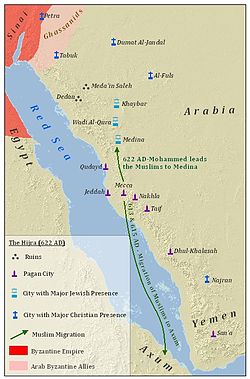- Hijra (Islam)
-
For other uses, see Hijra (disambiguation).
Hijra Other names The Flight of Mahomet;[1][2] The Migration of Mohammad; The Migration; Hijrah; Hegira Participants Muhammad and his followers Location Arabian Peninsula Date 622 Result Renaming Yathrib as "the City (of the Prophet)" (Medina); Enmity between the Aus tribe and Khazraj tribes dampened (tribes converted to Islam); Muhammad made political leader and united the new Muslims This article is part of the series: Islam 
The Hijra (هِجْرَة) is the migration or journey of the Islamic prophet Muhammad and his followers from Mecca to Medina in 622 CE. Alternate spellings of this Arabic word are Hijrah, Hijrat or Hegira, the latter following the spelling rules of Latin.
Contents
Hijra of Muhammad
In September 622, warned of a plot to assassinate him, Muhammad secretly slipped out of Mecca with Abu Bakr.[3] However, two hadiths conclude that Abu Bakr was among the first who migrated to Medina, before the migration of Muhammad.[4][5] Muhammad and his followers emigrated to the city of Yathrib, 320 kilometres (200 mi) north of Mecca, in several steps. Yathrib was soon renamed Madinat un-Nabi, literally "the City of the Prophet", but un-Nabi was soon dropped, so its name in English is Medina, meaning "the city".[6] The Muslim year during which the Hijra occurred was designated the first year of the Islamic calendar by Umar in 638 or 17 AH (anno hegirae = "in the year of the hijra").[6] In the following chronology[6] the city will be referred to as Medina, and the region surrounding it as Yathrib.
Day Date Notes Day 1
Thursday26 Safar AH 1
(9 September 622)Left home in Mecca. Hid three days in the Cave of Thur south of Mecca. Day 5
Monday1 Rabi' I AH 1
(13 September 622)Left the environs of Mecca. Traveled north to the region of Yathrib. Day 12
Monday8 Rabi' I AH 1
(20 September 622)Arrived at Quba' near Medina. Day 16
Friday12 Rabi' I AH 1
(24 September 622)First visit to Medina for Friday prayers. Day 26
Monday22 Rabi' I AH 1
(4 October 622)Moved from Quba' to Medina. The Muslim dates are in the Islamic calendar extended back in time. The Western dates are in the Julian calendar. The Hijra is celebrated annually on 1 Muharram, the first day of the Muslim year, causing many writers to confuse the first day of the year of the Hijra with the Hijra itself, erroneously stating that the Hijra occurred on 1 Muharram AH 1 or 16 July 622 even though it occurred about 66 days later, nominally 8 Rabi' I.[6]
All dates given above may have occurred about 89 days (three lunar months) earlier. The Muslim dates may be those recorded in the original Arabic calendar and their month names may not have been changed to account for the (probably three) intercalary months inserted during the next nine years until intercalary months were prohibited during the year of Muhammad's last Hajj (AH 10).[7]
First Hijra
Main article: Migration to AbyssiniaTechnically, the first Hijra occurred in 615 when a group of Muslims was counseled by Muhammad to escape persecution in Mecca and travel to the Kingdom of Axum, which was ruled by a Christian king (see Islam in Ethiopia). Muhammad himself did not join this emigration. In that year, his followers fled Mecca's leading tribe, the Quraysh, who sent emissaries to Axum to bring them back to Arabia. The nascent movement faced growing opposition and persecution. When Muhammad and his followers received an invitation from the people of Yathrib, they decided to leave Mecca.
See also
- Battle of Badr
- List of Islamic terms in Arabic
- Prophetic biography
References
- ^ "Dates of Epoch-Making Events", The Nuttall Encyclopaedia. (Gutenberg version)
- ^ Mahomet is an archaism used for Muhammad. See Medieval Christian view of Muhammad for more information.
- ^ Moojan Momen (1985), p. 5.
- ^ Saheeh Bukhari Hadith 1:661
- ^ Saheeh Bukhari Hadith 6754
- ^ a b c d F. A. Shamsi, "The Date of Hijrah", Islamic Studies 23 (1984): 189-224, 289-323.
- ^ See Islamic calendar
External links
Categories:- Arabic words and phrases
- Life of Muhammad
- Islamic terms
- Shi'a days of remembrance
Wikimedia Foundation. 2010.

